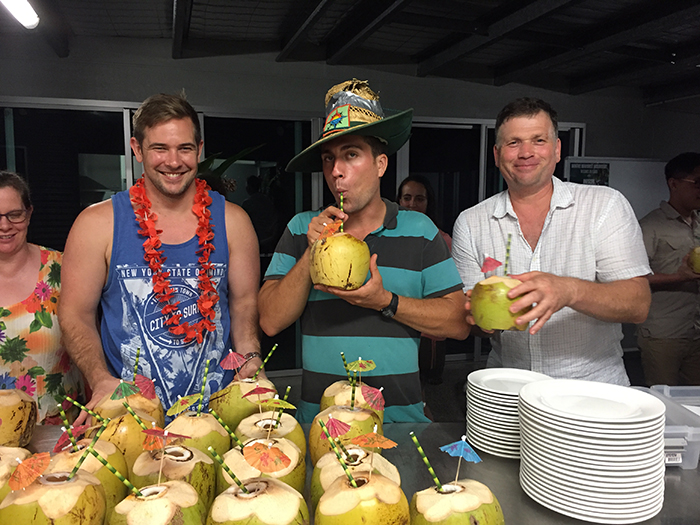Education
The Daintree Rainforest Observatory is like a blank canvas, it is only limited by your imagination.
We welcome all Year 10-12 High School classes, Undergraduate courses, and educational workshops and conferences. You can take advantage of our DRO led activities, experience our amazing Canopy Crane, or build your own activities. Please note that all users of the Canopy Crane must be 16 years old and above.
Come and visit for a day, or really immerse yourself in our magical rainforest environment by staying on site. Make your final night really special by celebrating around our bonfire and soaking in a view of the stars that is second to none.
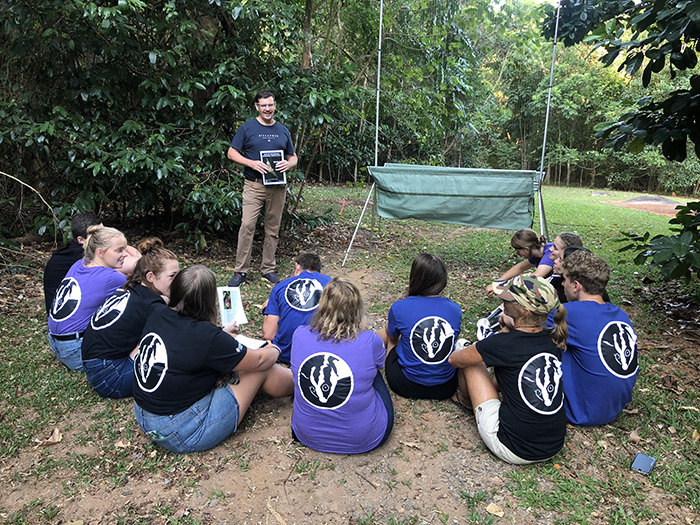
The station operates Monday – Friday. We receive High School classes from Yrs 10 – 12 and educational tour groups. We offer a special discounted accommodation rate to local High Schools.
You are welcome to run your own activities at the station or you can participate in DRO led activities. Local High Schools also have the option of taking part in Classroom in the Rainforest, an initiative between the Daintree Rainforest Observatory, Education Queensland, and James Cook University.
Currently the Daintree Rainforest Observatory offers several activities:
- Revegetation
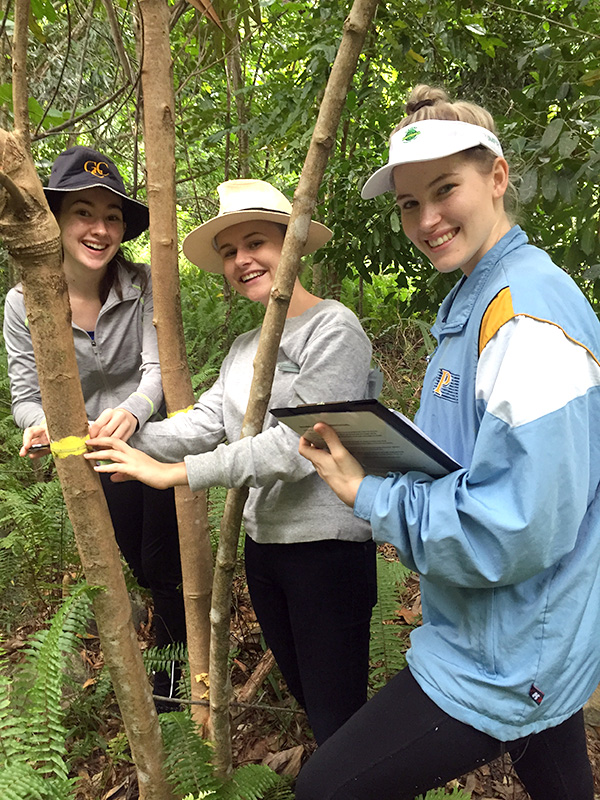
The revegetation project involves taking growth and health measurements which help with the regular surveying/monitoring of our revegetation plot. These measurements include such things as tree height, diameter at breast height, tree health, and presence/absence of fruit and flowers (called phenology). The measurements are identical to those that our scientists have been conducting for the past two decades when surveying the rainforest plot underneath the canopy crane. The trees in our revegetation plot were planted approximately ten years ago and with the help of visitors, we have been monitoring the plot from the very day these trees were planted.
Once the revegetation measurements have been collected by our visitors, the values are entered into a database for analysis. The regular monitoring of the plot allows us to answer important questions regarding tree growth rates, survival rates and tree succession. This is valuable information for understanding the most successful way of implementing large-scale revegetation projects in the future. The activity helps to promote awareness of how important revegetation is for increasing local biodiversity, creating wildlife corridors, managing salinity, reducing erosion, and offsetting carbon.
- Terrestrial Invertebrate Survey Techniques
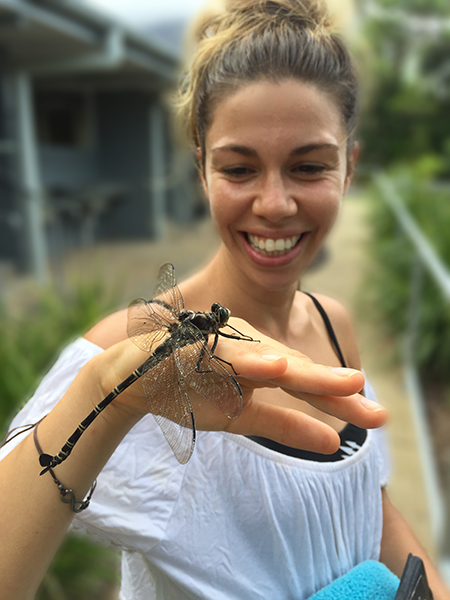
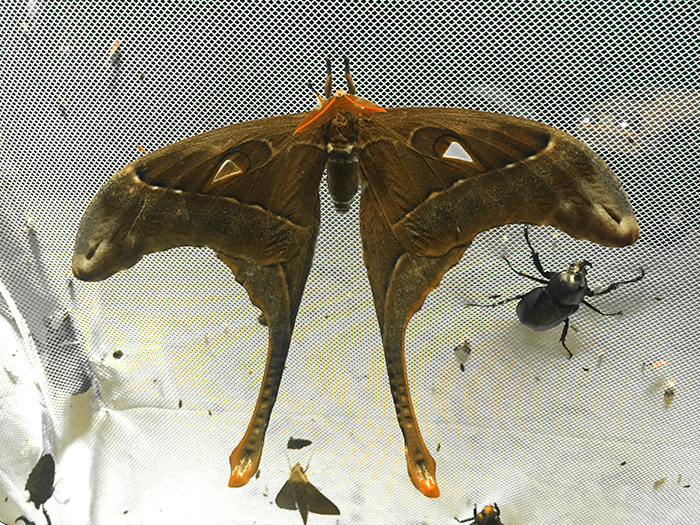
An introduction to how scientists collect and identify insects for research purposes. This activity involves discussions and hands on experiences of common terrestrial insect collecting methods, including sweep netting, beating, malaise traps, Tullgren funnels, as well as preservation techniques and the use of keys and reference material for identification. If you choose the extended overnight version of this activity, you must book for an afternoon session to allow for spotlighting and light trapping at night time.
- Aquatic Invertebrate Sampling
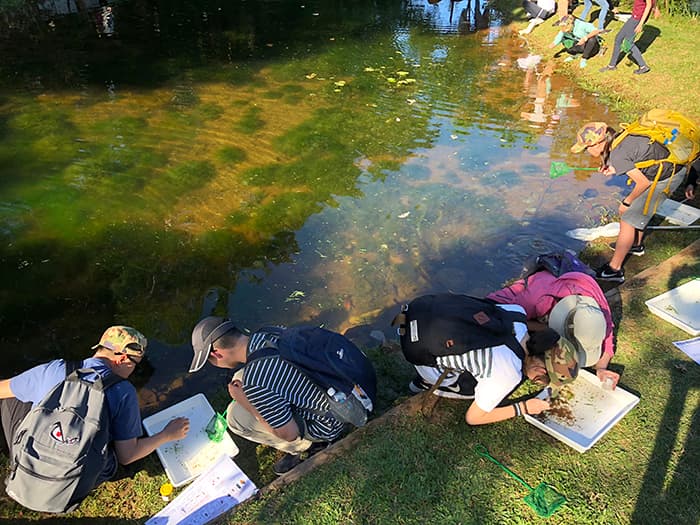
An activity which showcases how aquatic invertebrates can easily be used to ascertain water quality. Aquatic invertebrates are collected from our pond and then taken back to the laboratory for identification under the microscope. Easy to use keys allow quick identification and also rate species according to their sensitivity to pollutants in the water. The better the water source, the more likely you are to collect sensitive species.
Are you looking for a location where you can easily tick off those mandatory practicals for Unit 3 Biology? Then we have the perfect location for you.
Currently we are liaising with local High Schools to provide an easy environment within which to conduct the Year 12 Unit 3 Biology Mandatory Practicals. Whilst we don’t actually run the activities, we provide the location, habitats and support with which to tick off all of the mandatory practicals. There are many ways to interpret and conduct these practicals, but below you will find an example of how one of our visiting schools runs the pracs when based at the DRO:
Mandatory Prac 1 (Species Richness):
- Location = Myall Beach reef flats (5 minute drive from DRO)
- Abundance transect looking at algae and sea grass. T-test to ascertain if there is a difference in the diversity of the algae and the sea grass at different locations. Regression analysis to ascertain relationship between species diversity of the seagrass and the distance from shore.
Mandatory Prac 2 (Classify an Ecosystem):
- Location = Beach – Boardwalk rainforest (5 minute drive from DRO)
- Conduct a belt transect from littoral zone-mangrove-swamp-rainforest
- Take biotic measurements (plant species/canopy cover/number of: herbs, sedges, ferns, grasses, shrubs under .25m, shrubs 0.25-2m, shrubs >2m, tress >10m, trees 10-30m, trees >30m)
- Take abiotic measurements (water turbidity, pH, salinity, soil samples, organic matter)
Mandatory Prac 3 (Species Diversity):
- Location = Onsite at the DRO
- Compare two aquatic sites (Eg. riffles vs wetlands/pools/runs) for macroinvertebrate diversity using kick and sweep technique
Assessment (Student Experiment):
- Students choose either Prac 1 or 3 (Prac 2 not recommended)
- Modify original experiment by: i) refine the method/collecting technique; or ii) extend the experiment by testing a different habitat; or iii) redirect the study by looking at a different independent variable
Are you one of the lucky ones to be studying at JCU? Please click here to see which undergraduate courses have run at the Daintree Rainforest Observatory in the past.
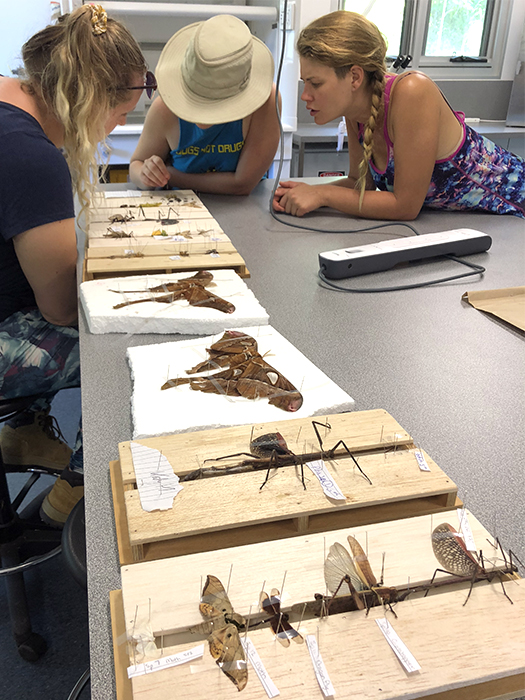
The Daintree Rainforest Observatory is the perfect location for running undergraduate courses, university conferences, and educational workshops. If you are looking for a fully immersive, unique, off-the-grid experience, then our field station could be perfect for your intensive course work, or educational event.
Please contact DRO staff to discuss how we can help you organize the field trip of a lifetime.
